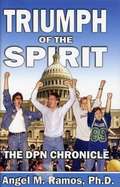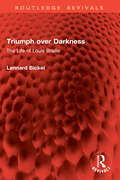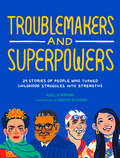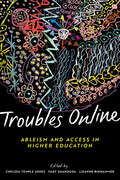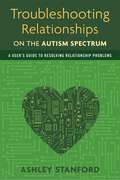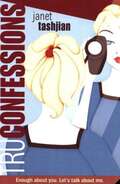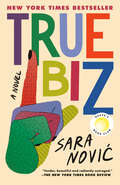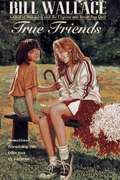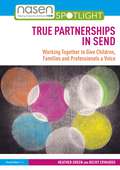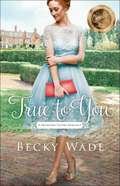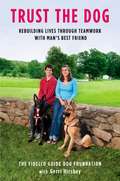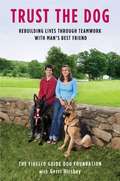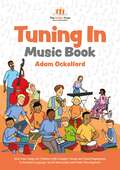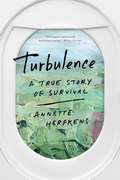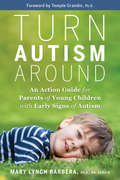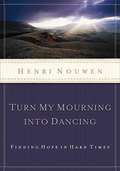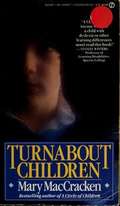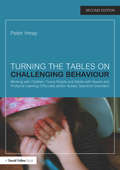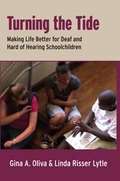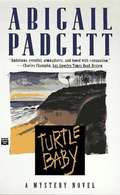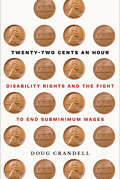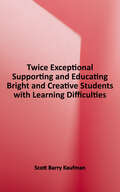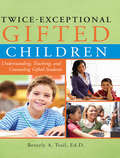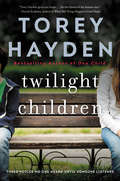- Table View
- List View
Triumph of the Spirit: The DPN Chronicle
by Angel M. RamosIn 1988 the world's only deaf liberal arts university, Gallaudet University in Washington, D.C. was ready for its next president. The Board of Trustees chose a hearing president who knew nothing about deafness. Unrest had been building on campus over this possibility, especially as there were highly qualified Deaf applicants. When the hearing person was selected and announced, the students exploded in protest. The next 7 days were covered by the national and international news media. What happened at Gallaudet had enormous worldwide impact. Since that protest, Deaf people have proudly advanced in all occupations. The DPN Movement has been likened to a civil rights movement for Deaf people. The author, Angel Ramos, PhD., was directly involved in the protest. Note: all spelling errors were in the print text.
Triumph over Darkness: The Life of Louis Braille (Routledge Revivals)
by Lennard BickelFirst published in 1988, Triumph over Darkness is a stirring story of determination and tenacity in the face of adversity. Born in France in 1809, Louis Braille was the 4th child of a village saddler. At the age of three he stabbed himself in the eye with a pointed tool taken from his father’s work bench. Some 13 years later he again took a sharp tool from the same bench and used it to create a code of raised dots punched through sheets of paper. With the patience of genius, he perfected his code- still unsurpassed-and fashioned an alphabet that opened the world of learning to the blind.Louis Braille died at the age of 43 unknown and unhonoured. He superiors at the Royal Institute for the Young Blind in Paris would not recognise the system that was not based on the shapes of the alphabet. Lennard Bickel researched this story in Paris and in the small village where Louis Braille was born. He tells of the trials and torments of a young blind man struggling amid the harshest conditions to perfect something he believed in. This book will be of interest to general readers interested in the life of Louis Braille.
Troublemakers and Superpowers: 29 Stories of People Who Turned Childhood Struggles into Strengths
by Keely GrandThis unique and hopeful biography collection explores the lives of 29 individuals from diverse backgrounds who turned their childhood struggles – their personal &“troublemakers&” – into strengths that enabled them to live their lives to the fullest.Troublemakers and Superpowers is filled with hopeful stories that explore the lives of individuals from diverse backgrounds who have had to navigate a &“troublemaker&” in their childhood, such as trauma, depression, ADHD, OCD, anxiety, or dyslexia. Each of these individuals had a turning point in their life that enabled them to understand not only their struggles but also their strengths and ultimately learn how to use them to go after their dreams.Did you know… Greta Thunberg used the strengths she discovered with her Asperger&’s Syndrome to start a climate revolution.Jonathan Van Ness&’s (JVN) struggle with childhood trauma and depression pushed him to learn self-love.Ed Sheeran overcame a stutter with the help of music. Emma Stone struggles with anxiety and discovered acting helps her manage her condition.Trevor Noah grew up in South Africa navigating the strict rules of apartheid, the inflexible traditions of catholic school, and being a kid with undiagnosed ADHD. Discovering stand-up enabled him to turn his fascinating life story into comedy. Dr. Maggie Aderin-Pocock struggled with dyslexia then discovered the benefits of her condition – good 3D spatial awareness – were ideal for a career as a space scientist. Each profile includes a full-page illustrated portrait and three pages devoted to the subject&’s inspiring story, which is interwoven with vibrant, playful art and illustrated quotes that highlight significant moments in each subject's story. The book also includes: A foreword for kids and an afterword for adults written by a licensed therapist to provide mental health context for readers.Definitions of the variety of conditions, disorders, and traumas covered in the book, vetted by mental health experts.A list of resources on topics covered in the book. The incredible stories of the individuals in this book are filled with hope and inspiration for kids, ages 8 and up, who are struggling with challenges in their lives, as well as for kids who love biographies. All readers will have a better understanding of what it's like to grow up with "troublemakers" and how they can be seen as "superpowers."
Troubles Online: Critical Approaches to Accessible Teaching and Learning
by Chelsea Temple Jones Fady Shanouda Lisanne BinhammerOnline education is often heralded as a solution for accessibility to higher education; however, ableism thrives online. In this timely collection, contributors aim to trouble what online teaching looks like and think critically about how disability is addressed in online classrooms. Through narratives, poetry, interviews, and scholarly analysis, they reflect on disabled, mad, sick, and crip online pedagogy and highlight the possibilities of expanding critical standards for accessible teaching and learning. Necessarily interdisciplinary, this collection retheorizes the classroom around a justice-based approach to online pedagogy and challenges the assumptions we have around universal design. Refusing to position access as an afterthought, this collection troubles our engagement with online accessibility in uncertain and evolving times.
Troubleshooting Relationships on the Autism Spectrum: A User's Guide to Resolving Relationship Problems
by Ashley StanfordDon't you wish relationships came with a manual? Ashley Stanford has written a user's guide to relationships that adopts a practical troubleshooting approach to resolving difficulties that will greatly appeal to the logical minds of individuals on the autism spectrum, as well as offering valuable guidance to their partners. Troubleshooting identifies problems and makes them fixable. This book presents a three-step troubleshooting process that can defuse even the trickiest relationship dilemma. Specific problem areas are covered in detail including communication, executive functioning, mindblindness, attachment, intimacy, co-habiting, and raising a family. The book offers straightforward solution-focused strategies and additional help is given in the form of bulleted lists, summaries, scripts, and example scenarios.
Tru Confessions
by Janet TashjianWish #1: To have my own television show. <p>Wish #2: For Eddie to be un-handicapped. (Eddie is my twin Brother.) <p>Wish #3: I don't really want anything else this year (except maybe to go out with Billy Meier). <p><p>Do wishes really come true? When Trudy Walker sees the ad from the local cable station, she truly believes they do. The station is looking to air demo tapes of shows created by and for teens. This could be Tru's big Break! But lately Tru is distracted by Wish #2. <p><p>She spends hours researching cures for Eddie online and filming his daily routine. If Tru becomes a star, if she just grows up, will she outgrow Eddie? Can she pursue her dreams and still be true to herself? Or is it all just wishful thinking
True Biz: A Novel
by Sara NovicTrue biz (adj./exclamation; American Sign Language): really, seriously, definitely, real-talk. <p><p> True biz? The students at the River Valley School for the Deaf just want to hook up, pass their history finals, and have politicians, doctors, and their parents stop telling them what to do with their bodies. <p><p> This revelatory novel plunges readers into the halls of a residential school for the deaf, where they’ll meet Charlie, a rebellious transfer student who’s never met another deaf person before; Austin, the school’s golden boy, whose world is rocked when his baby sister is born hearing; and February, the hearing headmistress, a CODA (child of deaf adult(s)) who is fighting to keep her school open and her marriage intact, but might not be able to do both. As a series of crises both personal and political threaten to unravel each of them, Charlie, Austin, and February find their lives inextricable from one another—and changed forever. <p><p> This is a story of sign language and lip-reading, disability and civil rights, isolation and injustice, first love and loss, and, above all, great persistence, daring, and joy. Absorbing and assured, idiosyncratic and relatable, this is an unforgettable journey into the Deaf community and a universal celebration of human connection. <p> <b>New York Times Bestseller</b>
True Friends
by Bill WallaceSometimes, friendship can take you by surprise but Judy, a girl with cerebral palsy had a motto: "If you fall down, just get up and keep going."
True Partnerships in SEND: Working Together to Give Children, Families and Professionals a Voice (nasen spotlight)
by Becky Edwards Heather GreenDrawing from first-hand discussions and interviews, this essential guide offers an in-depth, realistic overview of bringing up a child with complex and specific needs to enhance current practice and collaborative work with parents. This book supports the development of effective child-centred planning and family-centred approaches, by using the expert voices and lived experiences of parents to inform critical discussion and build the skills of professionals. Chapters provide strategies, guidance and suggestions to strengthen effective partnership work with parents, children and young people. Scenarios, key takeaways and questions for discussion are also woven throughout, offering a greater understanding of the barriers faced by parents of children with SEND and encouraging the reader to consider how they can more effectively co-produce with families. True Partnerships in SEND uses the voice of the parent and their lived experiences as the basis for narrative, research and discussion and includes wider concepts that can inform positive parent-professional interactions globally. It will be essential reading for SENCOs, teachers and other education professionals working with children with SEND and their families.
True to You (A Bradford Sisters Romance #1)
by Rebecca C. WadeBack Cover: "After a devastating heartbreak three years ago, genealogist and historical village owner Nora Bradford decided that burying her nose in her work and her books is far safer than romance in the here and now. Unlike Nora, former Navy SEAL John Lawson is a modern-day man, usually 100 percent focused on the present. However, when John, an adoptee, is diagnosed with an inherited condition, he's forced to dig into the secrets of his ancestry. John enlists Nora's help to uncover the identity of his birth mother, and as they work side by side, this pair of opposites begins to suspect that they just might be a perfect match. But can their hope for a future survive their wounds from the past?"
Trust the Dog
by Gerri Hirshey Fidelco Guide Dog FoundationA groundbreaking look at the special bond between guide dogs and those who thrive with their help From a pioneering guide dog organization comes the first book to explore one of the most profound and inspiring relationships between humans and animals. In Trust the Dog, the Fidelco Guide Dog Foundation introduces readers to a group of extraordinary people who, thanks to their guide dogs, flourish in a world that assumes the ability to see. Among them are a brother and sister who lost their sight at a very young age and whose dogs essentially helped them grow up, a Serbian girl who fled civil war to find new hope in America, and a newly blind single father determined to keep his family together against all odds. Through their experiences we discover the astonishing teamwork and devotion between people who are blind and their guide dogs, the intelligence and discipline that these animals unfailingly display, and the noble work of the nonprofit organization that for fifty years has been making it all possible. A heartwarming tribute to this unique relationship, Trust the Dog is sure to change how we think about man's best friend, and the possibilities of life without sight.
Trust the Dog: Rebuilding Lives Through Teamwork with Man's Best Friend
by Gerri HirsheyA groundbreaking look at the special bond between guide dogs and those who thrive with their help. From a pioneering guide dog organization comes the first book to explore one of the most profound and inspiring relationships between humans and animals. In Trust the Dog, the Fidelco Guide Dog Foundation introduces readers to a group of extraordinary people who, thanks to their guide dogs, flourish in a world that assumes the ability to see. Among them are a brother and sister who lost their sight at a very young age and whose dogs essentially helped them grow up, a Serbian girl who fled civil war to find new hope in America, and a newly blind single father determined to keep his family together against all odds. Through their experiences we discover the astonishing teamwork and devotion between people who are blind and their guide dogs, the intelligence and discipline that these animals unfailingly display, and the noble work of the nonprofit organization that for fifty years has been making it all possible. A heartwarming tribute to this unique relationship, Trust the Dog is sure to change how we think about man's best friend, and the possibilities of life without sight.
Tuning In Music Book: Sixty-Four Songs for Children with Complex Needs and Visual Impairment to Promote Language, Social Interaction and Wider Development
by Adam OckelfordContaining 64 songs designed to promote language, social and musical development, this book accompanies the Tuning In Cards so you can perform the songs and integrate the activities into your own practice. When paired with the Tuning In Cards, it will offer an innovative way of developing communication in children with profound disabilities, visual impairment, and autism.These songs have been developed in line with the Sounds of Intent framework, and a helpful introduction by the composer describes how to adapt the songs and activities to the appropriate developmental level.
Turbulence: A True Story of Survival
by Annette HerfkensA riveting, inspirational true story of an incredibly resilient woman who broke professional barriers as a Dutch banker, was the sole survivor of Vietnam Airlines Flight 474, found love after the loss of her fiance, and continues to raise her autistic son, never wavering in her optimism.On the morning of November 14, 1992, Annette Herfkens, a top Dutch banker (and one of the few female international bond traders on Wall Street), packed her luggage for a romantic getaway with her longtime fiance, Willem. At 6:25 that morning, Annette and Willem boarded the plane out of Ho Chi Minh City, with twenty-three other passengers and six crew members, excited to finally have a vacation together. Six minutes before landing, flying at speed of 300 miles per hour, the plane lost altitude and crashed along a mountain ridge in the jungle of Vietnam. At first Annette heard the voices of other passengers, but soon they went quiet. Annette was the only survivor. For eight days she lay injured and alone, with only rainwater to sustain her. Presumed dead, her obituary made it into local newspapers. What followed is an incredible story of survival, mystery, and the endurance of spirit. Even after surviving and learning to cope with her harrowing experience, Annette's biggest life challenge began years later, when her son Maxi was diagnosed with autism. As she weathered the joys and challenges of raising Maxi, Annette often called upon the profound insights she learned during those eight days, viewing every turbulent event in her life with the unflinching optimism of a true survivor. This is an inspiring account of one woman's journey and perseverance, as a plane-crash survivor and even more so as a devoted mother to her autistic son, but also of discovering strength and beauty in unexpected places.
Turn Autism Around: An Action Guide for Parents of Young Children with Early Signs of Autism
by Mary Lynch BarberaThis is the first book of its kind that calls attention to an important fact: parents can make a tremendous impact on their child through behavioral practices taught at home. Dr. Barbera has created a tool kit that any parent can use to help remediate--and in some cases eliminate-some symptoms of autism and other developmental delays in young children, even in as little as 15 minutes a day.Developmental delays and signs of autism usually show up before 18 months of age, yet children are often not diagnosed until they are 4 or 5 years old. In Turn Autism Around, Dr. Mary Barbera explains why parents can't afford to worry and wait in long lines for evaluations and treatment while not knowing how to help their children. She empowers parents, caregivers, and early intervention professionals to regain hope and take back control with simple strategies to dramatically improve outcomes for their children.Dr. Barbera has created a new approach to teaching kids with developmental delays that uses the science of Applied Behavior Analysis (ABA) married with a positive, child-friendly methodology that any parent can use--whether or not their child has delays--to learn to teach communication skills, socialization strategies, as well as tackle sleep, eating, potty training, and behavior challenges in a positive, effective, and lasting way. Turn Autism Around is the first book of its kind that calls attention to an important fact: parents can make a tremendous impact on their child's development through behavioral practices taught at home, even in as little as 15 minutes a day. Her program shows these autism and developmental delays can be remediated, and in some cases, delays can be caught up altogether, if parents intervene while the child is young. This book is for parents of young children aged one-to-five years who are passionate about helping their child as well as learning how they can change the trajectory of their child's and family's life.
Turn My Mourning Into Dancing: MOVING THROUGH HARD TIMES WITH HOPE
by Henri NouwenWith touching examples drawn from his own experience and the lives of those he has served as a pastor, Henri Nouwen articulates five specific "movements" that provide both a model for living through grief and a summary of the gifts our suffering can bring us. In five simple but eloquent chapters, he shows how our hard times can move us.
Turnabout Children: Overcoming Dyslexia and Other Learning Disabilities
by Mary MaccrackenAfter receiving her masters degree in special education, the author decides to go into private practice as a learning-disabilities specialist. In this book, she tells of five of the children she worked with, and the techniques she used to help each child overcome his or her unique set of difficulties.
Turning the Tables on Challenging Behaviour: Working with Children, Young People and Adults with Severe and Profound Learning Difficulties and/or Autistic Spectrum Disorders
by Peter ImrayFully updated, and with new sections on behaviourism, attachment disorders, neuro-scientific developments and working with dis-engaged learners, this second edition of Turning the Tables contains real-life case studies, strategies for identification and handy hints and tips throughout. It is the authoritative guide to tackling challenging behaviour and working effectively with children, young people and adults with severe learning difficulties (SLD), profound and multiple learning difficulties (PMLD) and those on the autistic spectrum with a dual ASD and learning difficulties diagnosis. With a unique approach, the author stresses the need to diagnose not only the correct difficulty but the degree of learning difficulty for a lasting resolution, as well as tackling common behavioural problems such as attention needing and task avoidance. Chapters are split into three specific areas, SLD, PMLD and ASD/SLD, covering: the 'Magnificent Seven' fundamental principles of challenging behaviour strategies for correct identification of the main area of learning difficulty improving teaching methods and strategies to resolve challenging behaviour, including handy hints and tips when things don’t go to plan extensive use of real case studies to illustrate strategies for resolution guidance on writing your own Behaviour Support Plan. This is a practical and authoritative guide to dealing with the myriad of challenging behaviours that constantly puzzle practitioners. It is an essential read for all professionals, parents and carers working with children, young people and adults with SLD, SLD/ASD and PMLD.
Turning the Tide: Making Life Better for Deaf and Hard of Hearing Schoolchildren
by Gina A. Oliva Linda Risser LytleBoth Gina A. Oliva and Linda Risser Lytle know what it is like to be the only deaf student in a mainstream school. Though they became successful educators, they recognize the need to research the same isolation experienced by other deaf and hard of hearing persons. In this way, they hope to improve education for current and future deaf students. Their efforts have culminated in Turning the Tide: Making Life Better for Deaf and Hard of Hearing Schoolchildren. Turning the Tide presents a qualitative study of deaf and hard of hearing students who attended mainstream schools. The authors conducted three focus groups in different regions in the country, enlisting six to eight participants with diverse backgrounds for each session. They also gathered information from 113 online respondents who answered the same questions used in the focus groups. The respondents discussed many issues, including the difficulties of finding friends and social access, the struggle to establish an identity, the challenges of K-12 interpreting and class placement, and the vast potential of summer and weekend programs for deaf students. Their empowering stories clearly demonstrate that no deaf or hard of hearing student should be educated alone. The authors also elicited comments on other changes that parents, advocates, and other allies could work toward to improve further the educational environment of deaf children.
Turtle Baby
by Abigail PadgettThe characters introduced in earlier books are here agaiEstrella and henry, Rombo and martin, Eva Broussard, elderly dog Mildred, Dar Reinert, Madge Aldenhoven. This time Estrella is pregnant, and Dr. Andrew LaMarche continues to court Bo. Will she give in? Other books by Abigail Padgett are available from Bookshare.
Twenty-Two Cents an Hour: Disability Rights and the Fight to End Subminimum Wages
by Doug CrandellIn Twenty-Two Cents an Hour, Doug Crandell uncovers the harsh reality of people with disabilities in the United States who are forced to work in unethical conditions for subminimum wages with little or no opportunity to advocate for themselves, while wealthy CEOs grow even wealthier as a direct result. As recently as 2016, the United States Congress enacted bipartisan legislation which continued to allow workers with disabilities to legally be paid far lower than the federal minimum wage. Drawing on ongoing federal Department of Justice lawsuits, the horrifying story of Henry's Turkey Farm in Iowa, and more, Crandell shows the history of the policies that have led to these unjust outcomes, examines who benefits from this legislation, and asks important questions about the rise of a disability industrial complex. Exposing this complex—which is rooted in profit, lobbying, and playing on the emotions of workers' parents and families, as well as the public—Crandell challenges readers to reexamine how we treat some of our most vulnerable fellow citizens. Twenty-Two Cents an Hour forces the reader to face the reality of this exploitation, and builds the framework needed for reform.
Twice Burned
by Bruce PorterfieldBruce Porterfield spent three terms in Bolivia with the New Tribes Mission. Much of his time there was spent with other missionaries in seeking to make a friendly contact with primitive tribes in remote areas of the country. The story of this work is told in his book, Commandos for Christ. In his second book, ["jungle Fire," which is also available in this library] Porterfield uses the novel as a means of revealing much truth about missionary work, the needs, problems and opportunities faced. In his latest book, Twice Burned, he again turns to the novel as a means of clarifying the issues between ecumenical and mass-meeting evangelism compared to the New Testament pattern of Gospel preaching and church planting.
Twice Exceptional: Supporting and Educating Bright and Creative Students With Learning Difficulties
by Scott Barry KaufmanIn an educational system founded on rigid standards and categories, students who demonstrate a very specific manifestation of intelligence flourish, while those who deviate tend to fall between the cracks. Too often, talents and interests that do not align with classroom conventions are left unrecognized and unexplored in children with extraordinary potential but little opportunity. For twice-exceptional (2e) children, who have extraordinary strengths coupled with learning difficulties, the problem is compounded by the paradoxical nature of their intellect and an unbending system, ill-equipped to cater to their unique learning needs. <p><p>Twice Exceptional: Supporting and Educating Bright and Creative Students with Learning Difficulties provides cutting-edge, evidence-based approaches to creating an environment where twice-exceptional students can thrive. Viewing the 2e student as neither exclusively disabled nor exclusively gifted, but, rather, as a dynamic interaction of both, leading experts offer holistic insight into identification, social-emotional development, advocacy, and support for 2e students. With chapters focusing on special populations (including autism, dyslexia, and ADHD) as well as the intersection of race and 2e, this book highlights practical recommendations for school and social contexts. In expounding on the unique challenges faced by the 2e population, Twice Exceptional makes a case for greater flexibility in our approach to education and a wider notion of what it means to be academically successful.
Twice-exceptional Gifted Children: Understanding, Teaching, and Counseling Gifted Students
by Beverly A. TrailGifted students with disabilities, also referred to as twice-exceptional children, need the strategies in "Twice-Exceptional Gifted Children: Understanding, Teaching, and Counseling Gifted Students" in order to find success in the regular classroom. By offering a thorough discussion of twice-exceptional students based on research into how gifted students with disabilities learn, the author helps teachers and education professionals develop a broad understanding of the complex issues associated with gifted students who have disabilities. This comprehensive text provides an overview of who these students are, how teachers can tap into their strengths and weaknesses, and what educational strategies should be implemented to help these students succeed in school and beyond. The book will guide a collaborative team step-by-step through the process of identifying students' needs, selecting modifications and accommodations, and developing a comprehensive plan to meet the diverse needs of twice-exceptional children. By implementing the strategies suggested in this book, teachers of twice-exceptional gifted students can ensure these students do not just survive in the classroom, but thrive.
Twilight Children
by Torey HaydenFrom the author of the phenomenal Sunday Times bestsellers 'One Child' and 'Ghost Girl', comes a startling and poignant memoir of three people's victimisation and abuse - and their heartbreaking but ultimately successful steps to recovery, with the help of Torey Hayden, an extraordinary teacher. Two children trapped in a prison of silence and a woman suffering in the twilight of her years - these are the cases that would test the extraordinary courage, compassion and skill of Torey Hayden and ultimately reaffirm her faith in the indomitable strength of the human spirit. While working in the children's psychiatric ward of a large hospital, Torey was introduced to seven-year-old Cassandra, a child who had been kidnapped by her father and was found dirty, starving and picking though rubbish bins to survive. She refused to speak, so Torey could only imagine what she'd been through. Drake, by contrast, was a charismatic four-year-old who managed to participate fully in his pre-school class without uttering a single word. Then, there was Gerda, eighty-two, who had suffered a massive stroke and was unwilling to engage in conversation with anyone. Although Torey had never worked with adults, she agreed to help when all other efforts had failed.
